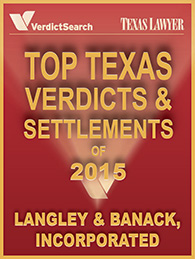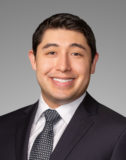FIDUCIARY LAW, ESTATE, TRUST AND WILL CONFLICTS
Langley & Banack’s Will Contest/Estate, Trust, and Fiduciary Litigation Team collectively has decades of experience in all types of inheritance and fiduciary disputes. In general, fiduciaries like executors, trustees, and administrators owe their beneficiaries some of the highest duties provided by law.
When a dispute arises about whether fiduciary duties were breached in any of the above relationships, the fiduciary litigation team at Langley and Banack is ready to assist you.
Langley & Banack’s attorneys specializing in this area are Joyce Moore, Christopher Hodge, and Jobe Jackson, who make up one of the best teams of attorneys in this area of the law in all of Texas. These attorneys collectively have decades of experience successfully litigating these types of disputes on both an hourly or contingency fee basis.
-
1. Will Contests
When someone dies in Texas, the disposition of their assets is controlled by one of the following:
-
Texas intestate succession – the Texas legislature has declared that if someone dies without a will or other testamentary dispositive document their property goes to their heirs in accordance with the laws of intestate succession.
-
The decedent’s last will and testament.
-
Any other testamentary documents, such as: (1) an inter vivos or revocable trust; or (2) pay-on-death or survivorship agreements with a financial institution; or (3) transfer on death deeds
Will contests take on many different forms, but there are generally allegations that the decedent, at the time he or she executed the will, did not have the requisite testamentary capacity and/or was unduly influenced by someone to execute the will. Wills can also be set aside on other grounds such as: mistake, fraud, or insane delusion.
In order for an individual to have testamentary capacity, they must: (1) know that they are making a will, (2) know what their property is, (3) know who their family is, and (4) understand the contents of the will as well as be able to make a reasonable judgment about the disposition of their assets. If any one of these elements is lacking at the time the decedent executes the will, the decedent lacked testamentary capacity and the will could be set aside on that ground. Dementia or other significant health events can have a significant impact on whether the person had testamentary capacity when they signed their will.
Typically, someone is unduly influenced by another to execute a testamentary document if the document would not have been executed but for the undue influence of the perpetrator. This is also a basis to set aside the will as invalid. Undue influence can occur quickly, like forcing someone to sign a will when they are in a vulnerable state, or it can occur over a long period of time when one descendant or other person close to the decedent through a pattern of conduct ends up being favored over other family members.
Once a person dies, in most cases their will needs to be offered for probate in order for it to be effective in Texas. Typically, whoever has control or possession of the will has a duty to turn it over to the court if demanded to do so.
A will can be offered for probate within four (4) years of the decedent’s death. After a will is admitted to probate it can be contested within two (2) years of being admitted to probate. Under Texas common law, every potential heir of a decedent is charged with notice of what is in the public records, which means the heirs have a duty to investigate any potential inheritance claims promptly after their relative dies.
-
2. Trust Contests
A trust is a legal relationship former when the trust’s creator delivers property to a trustee to hold for the benefit of a beneficiary. A trust may formed during the creator’s life or upon their death.
An “inter vivos” trust is a trust formed during the creator’s lifetime with property transferred into the trust during the creator’s life. Inter vivos trusts are typically controlled by the terms of a written agreement which controls the disposition of the trust’s assets for the benefit of the beneficiaries.
A “testamentary trust” is a trust created by the terms of a decedent’s last will and testament. Testamentary trusts are a relatively common occurrence in wills, especially wills that provide an inheritance to younger generations like grandchildren.
Both inter vivos and testamentary trusts, like wills, can be set aside through a trust contest. The grounds for contesting the validity a trust are similar to those for contesting a will.
-
3. Other Estate Disputes
In addition to a will contest, there are several other disputes that can arise regarding an estate. Some examples include:
-
Who should serve as the executor or the administrator of the estate – Texas law provides certain grounds for disqualifying individuals from serving as administrator of a decedent’s estate. Naturally, disputes arise about who should serve as administrator of the estate irrespective of what the decedent may have put in their will.
-
The nature of the assets of the estate – Texas is a community property state, which means that spouses typically jointly own any property acquired during their marriage. Therefore, a decedent may have a mix of community and separate property in his or her estate. The administrator or executor is bound by law to determine what property is owned by the estate and whether or not it is separate or community property. Disputes about what is separate and what is community property of the decedent, and whether administrator or executor made a proper determination of same, can occur.
-
Disputes over distribution of personal property – Many times if the provisions of the will are unclear as to the distribution of personal property, disputes can arise related to “who gets what” of the decedent’s personal effects. For example, if a will leave personal property “equally” among beneficiaries there can be disputes over what constitutes an “equal” share.
-
Unclear provisions in the Will – Unfortunately, people sometimes execute wills or testamentary documents that do not clearly articulate “who is supposed to get what” from the estate or are otherwise unclear. Texas law provides mechanisms to clarify and interpret what the decedent really intended in his or her will.
-
Breaches of fiduciary duty – Administrators and executors owe fiduciary duties to the estate’s beneficiaries. Those duties include loyalty, good faith, full disclosure, and others. Unfortunately, those duties are not always complied with and disputes arise. For instance, if an executor refuses to provide important information to a beneficiary the executor has breached their fiduciary duty of full disclosure and can be liable for damages and other judicial relief.
-
Removal of an Executor or Administrator – Texas law provides beneficiaries or creditors various grounds to remove an administrator or executor from their position controlling the estate. For instance, an administrator or executor can be removed from their position for stealing or misapplying estate property.
-
Judicial Discharge – All executors and administrators are entitled to seek a judicial discharge from their duties. A judicial discharge is a declaration by the court that the executor or administrator has completed their duties and there is no liability for the job that they have done. Beneficiaries has the right to challenge the granting of a judicial discharge.
-
4. Other Trust Disputes
In addition to a trust contest, there are several other disputes that can arise regarding a trust. Some examples include:
-
Removal of a Trustee – Texas law provides grounds for an “interested person,” which is typically a trust beneficiary, to seek to remove a trustee from their position overseeing a trust. For instance, a trustee may be removed when it fails to make an accounting that is required by law or the terms of a trust. Additionally, the terms of the trust itself may provide ground for removing the trustee.
-
Breaches of Fiduciary Duty – A trustee owes fiduciary duties to the beneficiaries of the trust. Those fiduciary duties include loyalty, care, and others. Unfortunately, trustees do not always comply with their fiduciary duties and a beneficiary can seek relief from the court when that happens. For instance, if a trustee fails to disclose important information to a beneficiary or steals trust property the trustee has breached its fiduciary duties.
-
Unclear provisions of the Trust – Unsurprisingly, the terms of some trusts are not a model of clarity and outright do not make sense. For example, some trusts in existence today were drafted many decades ago and contain provisions that might not be applicable or appropriate in today’s world. Other trusts are the victim of drafting errors. Thankfully, Texas law provides various mechanisms to seek assistance from the court to interpret and, where appropriate, modify the terms of a trust.
-
The funding of the Trust – Testamentary trusts are funded from the decedent’s estate as set forth in the decedent’s will. Sometimes the will provides that the executor has discretion as to what assets from the estate to put or not put in the Trust. Where there is discretion to make decisions there is often disagreement. Texas law provides mechanism to resolve a dispute over how a testamentary trust is funded from the decedent’s estate.
-
5. Power of Attorney Abuse
A statutory durable power of attorney is a popular estate planning tool frequently executed alongside a will. The statutory durable power of attorney generally allows a “principal” to designate a specific person, known as an “agent,” to act as a fiduciary and make important decisions on the principal’s behalf. For instance, it is relatively common for a statutory power of attorney to allow the agent to make financial decisions on behalf of the principle, among other important decisions regarding the principal’s property.
In a perfect world the agent responsibly uses the important powers granted by the statutory durable power of attorney to act only in the best interest of the principal; however, that does not always happen and Texas law provides tools to monitor and correct misbehavior by the agent. Unfortunately, as the general population ages and dementia and Alzheimer’s become more prevalent, we have seen an increase in cases where an agent has abused its powers to take advantage of a vulnerable principal.
-
6. Non-Probate Transfers
Disputes about non-probate transfers typically, but not always, involve a beneficiary designation on an account that is changed to benefit one person to the exclusion of others. Non-probate transfers such as pay-on-death bank accounts or joint accounts with rights of survivorship pass outside of the probate process and are not controlled by intestate succession or the terms of the Decedent’s will. For example, a dispute can arise when a parent’s will gives his or her estate equally to children but the vast majority of the parent’s assets pass outside of probate through a bank account pay-on-death designation to a single child.
Like a will, the agreement creating a non-probate transfer of assets can be set aside as invalid based on undue influence, lack of capacity, fraud, mistake, and other means.
-
7. Other Fiduciary Litigation
In addition to the fiduciary relationships created in the estate and trust context, Texas law also defines the following relationships, among others, as fiduciary in nature:
- Employees towards their employers
- Lawyers/Attorneys with their clients
- Brokers with their customers
- Agents with their principals
- Guardians with the ward
- Spouses to each other
- Business partners to each other.
Introducing Christopher T. Hodge
Chris Hodge is a Shareholder in Langley & Banack’s San Antonio Office. Mr. Hodge’s practice is focused primarily on Estates, Trusts, Fiduciary Litigation including will contests, trust contests and contested estate and trust proceedings. Mr. Hodge sits on the Firm’s Management and Executive Committees, leads the Firm’s partnership with the Association of Corporate Counsel and is the current Chair of the Fiduciary Litigation Section of the State Bar of Texas’ Real Estate, Probate and Trust Law Section.
 (210) 253-7125
(210) 253-7125
See Full Bio
Introducing Jobe S. Jackson
Jobe Jackson is a Shareholder in Langley & Banack’s San Antonio office. Mr. Jackson’s practice is focused primarily on Estate, Trust, and Fiduciary Litigation, as well as general Civil Litigation and appeals. Mr. Jackson has significant litigation and appellate experience, including: first chair jury trial experience in Bexar County, Texas; first chair experience in arbitration before the American Arbitration Association; and appellate briefing before the Texas Fourth Court of Appeals and the Texas Supreme Court. Mr. Jackson was named a Rising Star in Estate and Trust Litigation by Thompson Reuter’s Texas Super Lawyers in 2019. He has also been repeatedly recognized as a Rising Star by SA Scene magazine in San Antonio.
 (210) 736-6600
(210) 736-6600
See Full Bio
Introducing Joyce W. Moore
Joyce Moore is a Trust and Probate Litigation attorney who also handles commercial and oil and gas litigation matters. Ms. Moore is a frequent lecturer for the State Bar of Texas and other professional groups on the subject of fiduciary litigation and was selected by the State Bar to be the course director for the Bar’s first comprehensive fiduciary litigation seminar in May 2004. She was named as the 2012 San Antonio “Lawyer of the Year” in Trust and Estate Litigation by Woodward and White’s Best Lawyers in America and as the 2012 Outstanding Probate and Estate Planning Attorney in the San Antonio Business Journal.
 (210) 736-6600
(210) 736-6600
See Full Bio

Listen to our Will Contest Focused Litigation Podcast Series
Welcome to our first series of the Langley & Banack Podcast. In this seven part series we cover Will Contest focused Fiduciary Litigation. This series is hosted by Chris Hodge and Jobe Jackson, attorneys on our Estate, Trust and Fiduciary Litigation team.
Listen
(210) 253-7125
(210) 736-6600
(210) 736-6600



 Fiduciary Law, Estate, Trust and Will Contests
Fiduciary Law, Estate, Trust and Will Contests















